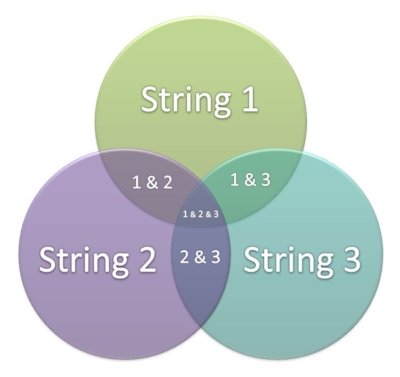Systematic Literature Review – combining your search strings
03/05/2024

Our previous posts on the systematic review have looked at:
- Systematic Literature Review – Where do I begin?
- Systematic Literature Review – Selecting your Sources
- Systematic Literature Review – Identifying your search terms and constructing your search strings
This post will discuss combining your search strings to create your search strategies.
Search Strategies
Once you have your search strings, the next step is to search using combinations of your search strings to identify literature which focuses specifically on aspects of your research topic. You can use the Boolean operators AND, OR and NOT to combine the search strings. Note: be wary of using the NOT operator as this will exclude any of the words in the NOT string from your search and may result in relevant articles being inadvertently excluded.
If we take the search strings from our previous post as an example, relevant articles might be found by searching for:
String 1 and String 2
(“supply chain*” OR “supply network*” OR “demand chain*” OR “demand network*” OR “value chain*” OR “value network*”) AND (“lead time compression” OR “lead time reduction” OR “cycle time compression” OR “cycle time reduction” OR “dwell time compression” OR “dwell time reduction”)
String 1 and String 3
(“supply chain*” OR “supply network*” OR “demand chain*” OR “demand network*” OR “value chain*” OR “value network*”) AND (agil* OR “quick response” OR speed*)
String 2 and String 3
(“lead time compression” OR “lead time reduction” OR “cycle time compression” OR “cycle time reduction” OR “dwell time compression” OR “dwell time reduction”) AND (agil* OR “quick response” OR speed*)
String 1 and String 2 and String 3
(“supply chain*” OR “supply network*” OR “demand chain*” OR “demand network*” OR “value chain*” OR “value network*”) AND (“lead time compression” OR “lead time reduction” OR “cycle time compression” OR “cycle time reduction” OR “dwell time compression” OR “dwell time reduction”) AND (agil* OR “quick response” OR speed*)
The diagram below illustrates how your strings above could be put together.

Which fields should I search in?
Researchers should usually avoid searching the full text field, opting instead to search, for example, the abstract, title and keyword fields when carrying out their systematic review. Searching the full text field may produce too many results and reduce the relevance. Restricting to just one of the fields mentioned above may produce too few results.
I’m receiving too many results…
If your search retrieves too many results or too many irrelevant results, the AND operator can be replaced by a proximity operator, e.g., N/n*, Nn* or W/n*. Using a proximity operator signifies that your search terms must appear within a defined number of words of each other. An example of a search in Scopus could be:
(“supply chain*” OR “supply network*” OR “demand chain*” OR “demand network*” OR “value chain*” OR “value network*”) W/3 (agil* OR “quick response” OR speed*)
Only papers where (“supply chain*” OR “supply network*” OR “demand chain*” OR “demand network*” OR “value chain*” OR “value network*”) appear within three words of (agil* OR “quick response” OR speed*) and vice-versa will be returned in the results. This will not only reduce the number of results but may also increase relevancy.
If you wish to specify the order your search terms appear in your results, Scopus offers the PRE/n* operator. An example of a search could be:
(“supply chain*” OR “supply network*” OR “demand chain*” OR “demand network*” OR “value chain*” OR “value network*”) PRE/3 (agil* OR “quick response” OR speed*)
In this example, only papers where (“supply chain*” OR “supply network*” OR “demand chain*” OR “demand network*” OR “value chain*” OR “value network*”) precedes (agil* OR “quick response” OR speed*) within three words, will be returned in the results.
A proximity operator is a good way to give context to two keywords, where a phrase may be too restrictive. For example, you may find that some papers do not use the exact phrase “lead time reduction”, but instead word it as, e.g., ‘reducing the lead time’. If you use the phrase “lead time reduction”, papers discussing how they ‘reduced the lead time’ would not be returned. However, if you use a proximity operator, e.g., in Scopus: reduc* W/3 “lead time”, papers that mention “lead time reduction” and papers that mention ‘reducing the lead time’ or ’the lead time was reduced by’ will be returned in your results.
The proximity operator syntax varies between databases; Scopus uses W/n* and PRE/n*, ProQuest One Business uses N/n* and P/n*, EBSCO uses Nn*and Wn*, and Web of Science uses NEAR/n*. Not all databases offer a proximity operator function. Check the search tips of your favourite databases to find out which functions are available.
*n = number
Further help
Carrying out a systematic literature review is an iterative process, and to do it well takes time. Simply identifying the keywords and search strings can take several attempts and requires patience. You may think you have the perfect search strings but then find that they produce too many results or none at all. If this is the case, something may have gone wrong either in terms of:
- the keywords being used,
- the way the keywords are being combined to make a search string,
- the way in which the search strings are being combined with each other.
Sometimes the only way to identify this is to systematically go through each search string one at a time, removing and adding words until the problem is identified. Alternatively, you may not have understood the way in which the database you are using works, e.g., are you using the correct operators? Are you searching the appropriate fields? Have you forgotten the quotation marks around phrases?
Other blog posts you may find useful
- Systematic Literature Review – Where do I begin?
- Systematic Literature Review – Selecting your Sources
- Systematic Literature Review – Identifying your search terms and constructing your search strings
Contact us
Because of the complexity of this process, we recommend that before embarking on a systematic literature review you contact the Library and we will be happy to provide guidance.
Categories & Tags:
Leave a comment on this post:
You might also like…
Changes to FitchConnect…
Those of you who have been using FitchConnect may have noticed that things are changing. The BMI content we subscribe to being migrated to its own platform. In the meantime, when you login to Fitch, ...
Love in the first degree – Management MSc students plan to get married!
After meeting at Cranfield whilst studying Management MSc, Isabel and Vatsal share their fond memories of Cranfield and what the future holds. Tell us about yourself Isabel: My name is Isabel Hamm and I'm originally ...
Our Cardiff study tour – an incredible experience that goes beyond academic learning
My name is Hyelni David Malgwi, originally from Nigeria. I am currently pursuing a master’s in Logistics and Supply Chain Management. I recently had the fantastic opportunity to participate in a study tour to Cardiff, ...
Air Transport Management MSc student Quentin Lacoste on studying at Cranfield and his exciting new job role
Quentin Lacoste is studying for an MSc in Air Transport Management (ATM). Here, he talks about his journey to Cranfield, his experience on the course, and his exciting new job offer. ...
Advancing Uncrewed Aerial Systems: My Journey at Cranfield University
Cranfield University has offered me countless opportunities in the short time I have been here, and I am committed to making the most of them. As an expert in drones and ...
How we’re helping the UK take back control of time
Our lives run on the supply of an invisible utility: accurate time. Starting with the morning alarm on our smartphone, it’s the basis of the everyday information we rely on for travel schedules, journey ...






